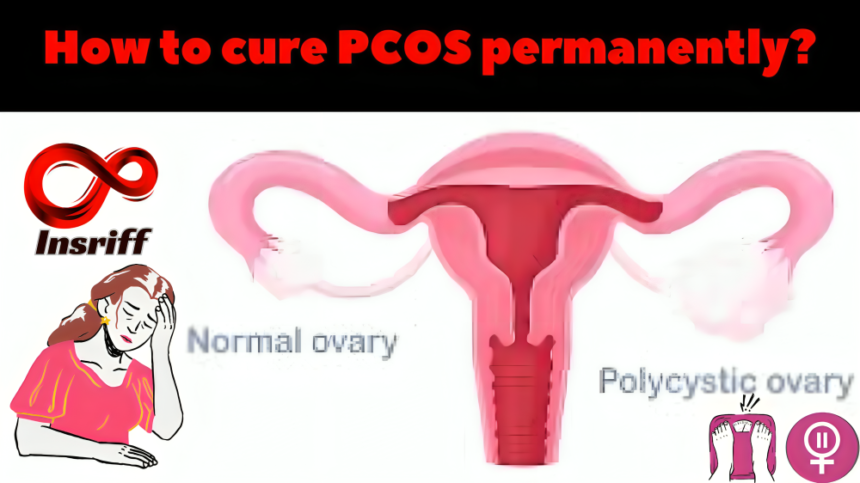As a Nutritional Therapist, I even have seen multiple causes of PCOS in my clinical life. You are at the right place if you want to know complete information about PCOS. Here, I will guide you on How to cure PCOS permanently and many other standards associated with PCOS.
Let’s come to the main point: what is PCOS? It stands for polycystic ovary syndrome, a complex endocrine ailment affecting hundreds of thousands of girls worldwide. Because of it, many hormonal imbalances, abnormal menstrual cycles, ovarian cysts, and numerous metabolic disturbances occur in females.
The hundred percent cure of PCOS is impossible. We can manage its symptoms by changing the lifestyle of patients as health professionals. In addition to standard clinical approaches, incorporating holistic strategies can drastically improve the overall well-being of individuals with PCOS.
Causes of PCOS
The specific reason for PCOS is unknown. However, it’s widely thought to be complex, regarding a mixture of genetic and environmental elements. Some of the most common causes of PCOS are
- Hormonal Imbalance
- Insulin Resistance
- Genetics
- Inflammation
- Hormonal Imbalance
PCOS is associated with accelerated ranges of androgens (male hormones), which incorporate testosterone, which might disrupt the everyday functioning of the ovaries.
- Insulin Resistance
Many people with PCOS have insulin resistance, in which the frame’s cells become much less responsive to insulin, mainly to extended insulin stages. This can stimulate the ovaries to deliver more androgens.
- Genetics
There appears to be a genetic element to PCOS because it frequently runs in households. Specific genetic versions can also predispose humans to growing the condition.
- Inflammation
Chronic low-grade infection may also play a function in the improvement of PCOS, contributing to insulin resistance and hormonal imbalances.
Symptoms of PCOS
The symptoms and indicators of PCOS can differ from person to person. Among all women, the most prevalent symptoms are:
- Irregular Menstrual Cycles
- Excess Androgen levels
- Polycystic Ovaries
- Weight Gain
- Infertility
- Metabolic issues
- Mood Disorders
- Irregular Menstrual Cycles
Women with PCOS might also enjoy abnormal periods or may additionally even prevent menstruating altogether.
- Excess Androgen Levels
It can cause symptoms of pimples, hirsutism (immoderate hair increase on the face, chest, or lower back), and male-pattern baldness.
- Polycystic Ovaries
It is characterized by multiple small cysts on the ovaries, visible through ultrasound.
- Weight Gain
One prominent sign of PCOS is overweight girls or women.
- Infertility
PCOS is a leading cause of infertility in girls because of abnormal ovulation or loss of ovulation.
- Metabolic Issues
Insulin resistance related to PCOS can growth the danger of type 2 diabetes, high cholesterol, and other metabolic issues.
- Mood Disorders
PCOS may lead to tension, anger, and loss of temper, which may further lead to depression in women.
Tests and Diagnosis
Laboratory testing, physical examinations, and scientific records are often used to diagnose PCOS.
Additionally, tests could include:
Menstrual History
It may include Irregular period cycles or absence of menstruation.
Physical Examination
The examination of excess hair follicles, pimples, or male-pattern baldness is the physical examination of PCOS.
Blood Tests
These tests assess hormone stages, including testosterone, estrogen, LH (luteinizing hormone), FSH (follicle-stimulating hormone), and insulin degrees.
Pelvic Ultrasound
The Pelvic region ultrasound is used to visualize the ovaries and look for multiple small cysts.
Risk Factors for PCOS
Certain elements can also increase the danger of developing PCOS or increase the risk of its symptoms:
Family History
Individuals with a family history of PCOS are at better risk of developing the condition.
Obesity
Excess weight or obesity is strongly related to PCOS and may cause worse signs and symptoms.
Insulin Resistance
PCOS is more likely in people with metabolic syndrome or insulin resistance.
Sedentary Lifestyle
Lack of physical interest can contribute to obesity and insulin resistance, worsening PCOS symptoms.
Hormonal Imbalances
Conditions, which include thyroid issues or adrenal gland disorders, can increase the danger of PCOS or exacerbate signs and symptoms.
Ways to Cure PCOS
There are a few methods that help every girl and woman how to cure PCOS permanently at home. The treatment options are:
- Nutritional therapy
- Regular exercises
- Stress management
- Supplements
- Herbal remedies
- Medical Innervation
Nutritional Therapy
Our healthy diet plays a vital role in treating the signs and symptoms of PCOS. Reduced insulin resistance, an essential feature of PCOS, and blood sugar stability can be achieved with a low glycemic index (GI) diet high in fiber, lean proteins, and healthy fats. It’s crucial to include healthy options like fruits, vegetables, whole grains, and legumes while limiting processed meals and refined sugars.
Here are some unique guidelines for PCOS related to Nutritional therapy.
If you don’t know how to cure the PCOS problem permanently, then these options are best for you.
- Always consume anti-inflammatory foods like fatty fish (salmon, mackerel), nuts, seeds, and turmeric.
- Opt for complicated carbohydrates over simple sugars to save you speedy spikes in blood sugar degrees.
- Including ingredients high in antioxidants, including berries, spinach, kale, and dark chocolate, to fight oxidative strain.
- Moderate caffeine and alcohol intake could increase the chances of hormonal imbalances.
Regular Exercise
Physical exercise is helpful in managing weight, decreasing insulin resistance, and enhancing overall hormonal stability in girls with PCOS. It incorporates an aggregate of cardio physical activities (along with taking walks, jogging, and cycling), and strength schooling can assist in adjusting menstrual cycles, decreasing testosterone degrees, and selling weight reduction. It should aim to do at least 150 minutes of mild-intensity exercise in a week, spread throughout several days, to experience all the advantages.
Stress Management
Chronic stress can worsen PCOS signs and symptoms by triggering hormonal fluctuations and increasing inflammation. Adopting stress-free strategies along with mindfulness meditation, deep breathing sporting events, yoga, and innovative muscle rest can help mitigate the impact of pressure on the body. Prioritizing good sleep, maintaining an everyday sleep agenda, and carving out time for relaxation sports are also crucial for hormonal stability and standard well-being.
Supplementation
Certain supplements may also supplement PCOS treatment by addressing precise dietary deficiencies and assisting metabolic fitness.
These consist of:
- Inositol: It helps improve insulin sensitivity and ovarian characteristics.
- Vitamin D: A deficiency of vitamin D is common in girls with PCOS, and supplementation may also improve insulin resistance and menstrual irregularities.
- Omega-3 fatty acids: They possess anti-inflammatory properties and can be a helpful resource in hormonal maintenance.
- Chromium: It mainly supports glucose metabolism and insulin sensitivity.
Note: It’s important to discuss with a healthcare expert before beginning any new supplements to ensure safety and effectiveness.
Herbal Remedies
Some herbal supplements have shown promise in dealing with PCOS symptoms, even though more studies are wanted to confirm their efficacy. These include:
- Spearmint tea: It reduces testosterone levels and alleviates hirsutism (extra hair boom).
- Cinnamon: This has been located to enhance insulin sensitivity and menstrual regularity.
- Saw palmetto: This herbal remedy helps to inhibit the production of androgens and can alleviate signs like zits and hair loss.
Medical Intervention
In some clinical cases, hormonal contraceptives, anti-androgen medicines, or insulin-sensitizing tablets can be prescribed to control specific signs and symptoms of PCOS. These treatments should be modified according to patient preference and guided by a healthcare provider familiar with the complexities of PCOS management.
Conclusion
I hope that after reading this article, you will know how to eliminate the problem of PCOS from your life permanently. I know it’s hard to change your lifestyle suddenly, but it’s not impossible. Remember that everyone’s experience with PCOS is different, so it’s essential to work with a medical professional and customize these tips to meet your needs. Long-lasting relief of PCOS can be achieved with determination and a good perspective.
REFERENCES:
- https://www.ncbi.nlm.nih.gov/pmc/articles/PMC3737989/
- https://www.nhs.uk/conditions/polycystic-ovary-syndrome-pcos/causes/
- https://www.nhs.uk/conditions/polycystic-ovary-syndrome-pcos/symptoms/
- https://bmcendocrdisord.biomedcentral.com/articles/10.1186/s12902-022-01208-y
- https://www.ncbi.nlm.nih.gov/pmc/articles/PMC8308732/
- https://pharmeasy.in/blog/diagnostic-how-to-cure-pcos-permanently-9-evidence-based-tips/
- https://www.mayoclinic.org/diseases-conditions/pcos/symptoms-causes/syc-20353439
FAQs
Q1: Is it possible to cure PCOS completely?
No, the complete treatment of PCOS is not possible. We help patients reduce their symptoms by a few factors, mainly lifestyle changes.
Q2: Can you conceive with PCOS?
Yes, you can conceive with PCOS, but irregular ovulation may cause numerous challenges for women. However, certain medications may help conceive the baby.
Q3 Is PCOS a hereditary condition?
Yes, many researchers say that PCOS is a hereditary condition, but they didn’t find its exact inheritance pattern because it is very complex.









